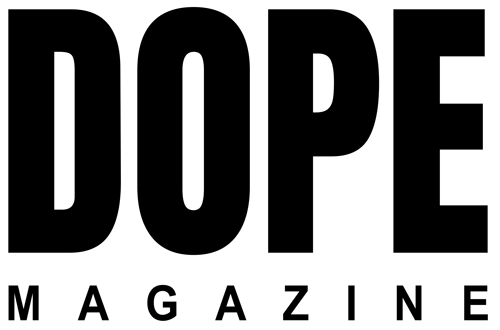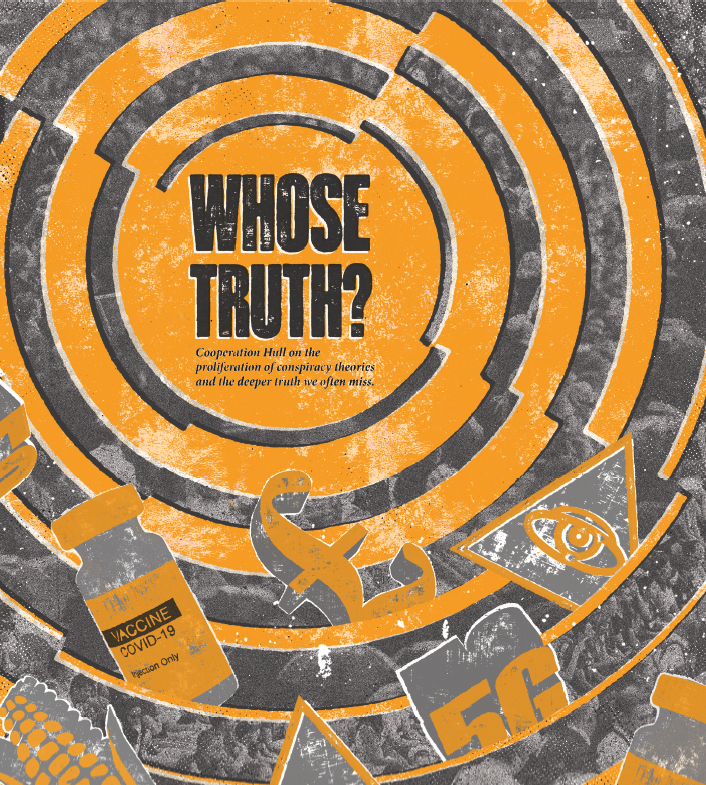Whose Truth?
By Gully Bujak. Illustration: Rory Robertson-Shaw
We all recognise there is a grain of truth in most conspiracy theories, yet we continue to dismiss them. What if, by mocking conspiracy theories and the people who believe in them, we're completely missing the point? What if that grain of truth holds some of the answers to not only the causes of our biggest crises but also how we can fight them? The fact is, there are dark forces shaping the world, and billions of pounds are being spent to make us go along with it. Luckily, once you see your enemy clearly, you can get on with the job of fighting him.
Recently, writings by two women have helped me think differently about the culture wars and conspiracy theories, and given me a new way of understanding what's happening in my city of Hull. Julia Steinberger ('What we are up against') and Naomi Klein ('Doppelganger') challenge us to look beyond the surface layer of misinformation and do more than recite well-rehearsed counterarguments in reaction. Since conspiracy theories are, in part, an attempt to create meaning in an increasingly meaningless, disorienting world, we must tell a deeper truth about the causes of our problems and a more convincing story about the solutions.
It's no surprise that conspiracy theories are taking particular hold in places like Hull. In a disillusioned red wall city with the lowest voter turnout in the country and the highest rates of fuel and food poverty, plus extreme vulnerability to climate events like flooding and drought but little tangible action to match it, people are of course looking for answers. With physical spaces gutted - as austerity continued to plunder the purses of the poor in order to line the pockets of the bankers and amplify disillusionment and distrust in the process - there has been no opportunity to find answers with each other through conversation and connection. Instead, answers are found in theories like the Great Reset - claims that centre on Klaus Schwab, the chairman of the World Economic Forum and a name we hear eerily often on the streets of Hull.
The theories cast Schwab and his cronies as communist dictators who created the pandemic in order to enslave us with vaccines, 5G, GMOs and a bunch of other stuff thrown in. Whilst the truth about Schwab is no more comforting (his financier's wet dream is to bring together 'stakeholders' like Facebook, Nestle and Chevron and put them on equal footing with other 'stakeholders' like governments and the public, to bring about a "better form of capitalism"), it is anything but secret. And while we're all distracted arguing the toss about precisely what kind of evil plutocrat Schwab is, a deeper truth is hidden from view.
In nearly two years of conversations on the streets and doorsteps of Hull, we've heard every conspiracy theory going. But not a single person has mentioned the very real Atlas Network. The Atlas Network, the subject of Steinberger's article, is an international collection of think tanks funded largely by the fossil fuel industry with the express aim of designing 'the climate of opinion'. A global army of influencers and lobbyists, they have become experts at muddying the waters, infiltrating every sphere of mass communication from universities to talk shows. The topics they meddle in are diverse, but the outcomes are consistent: climate denial and delay, social division, and a weakening of trust in anything, including ourselves.
This is one of the deeper truths we have so far failed to tell, particularly in austerity-ravaged, post-lockdown Britain. The pandemic disrupted a way of life that had been losing its veneer of stability for years. Long-denied contradictions shuddered into the light. Like the infinite pillaging of our finite planet. Or the illusion of agency in an attention-mined, undemocratic society. Or the sudden expectation of civic cooperation long after Thatcher told us there was 'no such thing as society' and even longer after capitalism began training us to be selfish and expect selfishness in return. Questions that had been mere niggles, gut feelings, suddenly loomed large and demanded answers. But the opportunity to respond was lost.
Since then, the gloves have come off. In the style of Putin and Steve Bannon - who called the tactic 'flooding the zone with shit' - some of the most damaging conspiracy theories have been picked up by mainstream politicians to further their agendas. Suella Braverman deliberately manipulated the 'Muslim grooming gangs' narrative to justify her own hostile policies, and the former Transport Secretary Mark Harper pedalled a 'sinister' version of 15-minute cities in order to win votes. Both theories have taken root in Hull and have led to real-world outcomes like this summer's riots. And, on the 15-minute cities theory in particular, the fingerprints of the Atlas Network are hard to ignore.
The original 15-minute city concept proposed a common sense, low-tech and green solution to huge, intersecting problems like air pollution, obesity, loneliness and the climate crisis. But it was quickly warped into something nefarious and, for many people, has become synonymous with totalitarianism, even eco-fascism. Now, its window of opportunity may be lost because the false version spreads faster and easier than the real. Because we have collectively failed to get out on the streets and into the pubs and tell an alternative story of now and, crucially, a believable and relevant story of tomorrow.
In Cooperation Hull, we're figuring out how to tell that story with our actions because words alone won't cut it anymore. The real opportunity to build a new world lies in winning the battle of ideas, and the only way to win them is to practice them, here and now, shoulder to shoulder with the very people we have been taught to dismiss in our supposedly selfish world. Because, ultimately, the biggest conspiracy theory of all, and the one we must work hardest to dispel, is the one that tells us humankind is selfish, competitive and doomed when the truth is that cooperation is in our bones and is the secret of our survival. Cooperation is in the history of our civilizations, and when we bring it back into our ideas and our practices - cooperative 'solidarity economies', cooperative decision-making via people's assemblies, cooperative communities who eat, argue and live together - the future is ours.
Gully Bujak is a founding member of Cooperation Hull, a group responding to a failing economy, a broken political system and a planet in crisis by building new democratic structures from the ground up.


